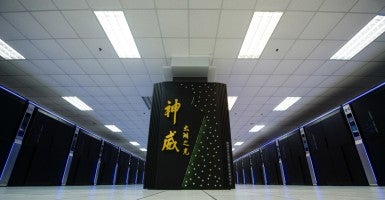On Monday, the inconceivable happened. China announced it had built the world’s fastest computer. China has always been good at copying and/or stealing intellectual property, but it has rarely produced “indigenous innovation,” particular in the high-tech sector.
The Chinese supercomputer, called the Tianhe-1A, is capable of performing over 2.5 thousand trillion operations a second and is big enough to fill a large warehouse. The processors weigh over 150 tons and can store information equal to about a hundred million books.
At its peak, the computer can perform around 93,000 trillion calculations per second. Purportedly, the Chinese supercomputer is 30 percent faster than the fastest American computer. “Considering that just 10 years ago, China claimed a mere 28 systems on TOP500 global supercomputer listing, with none ranked in the top 30, the nation has come further and faster than any other country in the history of supercomputing,” said Top500.
Last year the U.S. blocked Intel from shipping faster semiconductor chips to China on national security grounds. According to the New York Times, the United States blocked the sale of advanced microprocessors to China over concerns they were being used in nuclear weapon development. Without the Intel chips, the Chinese were forced to develop their own semiconductors, which apparently they are doing.
Pierre Ferragu, an industry technical analyst, said the new rankings showed that China was “pulling together all the building blocks of an independent semiconductor value chain.”
The TOP500 supercomputer rankings are published by Erich Strohmaier and Horst Simon of Lawrence Berkeley National Laps, Jack Dongarra, a professor of computer science at the University of Tennessee, and Martin Meuer of ISC Group.
Supercomputers are a vital indictor of national technological leadership, used for everything from the development of new weapon technologies, medicine to cyber-security. China states that their latest supercomputer is primarily for commercial purposes. Anyone following Beijing’s geopolitical activities in recent years will find this statement dubious at best.
































